
- Career Advice
- Salary Guide
- Dockwalk Presents
- Digital Dockwalk

How to Get a Job as a Yacht Stewardess

Kate got her start in the yachting industry working as crew. She spent five years cruising the Bahamas, Caribbean, New England, and Central America, then segued that experience into a career in marine journalism, including stints as editor of Dockwalk and ShowBoats International .
If you’re not afraid of hard work, have a knack for hospitality and service, and are a team player, then traveling the globe as superyacht stewardess could be in your future. Here is everything you need to know to land a job as a stewardess on a luxury yacht...
A yacht stewardess (or steward) is an entry-level position in yachting that provides a gateway to a career in hospitality at sea. A stewardess serves a vital role as part of the interior team and is responsible for the upkeep and presentation of the interior of a vessel.
One of the greatest appeals of working as interior crew on a superyacht (other than travel and tips ) is that the role of a stewardess doesn’t require extensive schooling or qualifications. While experience in the hospitality or customer service sector is advantageous, when starting out as a junior steward or stewardess, it is more about having a friendly disposition and being willing to learn and work hard.
“The ideal junior stewardess will have an eagerness to absorb information and learn the ropes properly, the ability to take direction and follow instructions, as well as the confidence to ask questions when clarification or additional instruction is needed,” says Sarah Bester with Northrop & Johnson Crew Services .
What is a Yacht Stewardess?
A steward or stewardess maintains the interior of a superyacht and provides five-star service to its owners and guests. On charter or owner trips, the interior team handles beverage and meal service, housekeeping, and laundry, all with the highest attention to detail. They have the most face time with guests so are responsible for relaying their wishes to the deck department, chef, and captain.
What Does a Yacht Stewardess do?
A junior member of an interior team on a yacht larger than 45 to 50 meters will typically start his or her career in the laundry room and/or in housekeeping rather than in service.
On smaller boats, the stewardess can be a department of one. “If you’re a solo stew you’ll be up early doing it all,” says Alene Keenan, a 30-year veteran of interior work who has literally written the book on yacht service, The Yacht Guru’s Bible. The day starts with opening duties: “setting up for breakfast, preparing breakfast, serving and clearing breakfast, laundry, cabin service, housekeeping duties, more laundry,” lists Keenan. This is followed by lunch service and more housekeeping and laundry, ongoing beverage service, setting up for afternoon activities, cocktails and hors d’oeuvres service, dinner service, cabin turndowns, finishing and returning laundry, and to close the day, pulling dishes, décor, and service items for the next day’s breakfast.
“If you have two or more interior crew, the duties are shared and probably rotated, and start times depend on hours of work and rest,” Keenan says.
- Top Tips For Working as a Stewardess
On larger yachts, the chief stew will provide his or her team with a checklist of duties to perform for each shift. “The routine will generally be the same,” says Chief Stewardess Tracey Bamforth . “You will be allocated a shift, shift duties, and shift expectations. You will wake up and dress in your on-charter uniform, making sure you are presentable, fresh, and on time. It’s important to remember that when the guests are on, your need to manage yourself to the best of your ability: speaking softly, working smartly, being very aware of your environment — for example, not leaving cleaning products out and about and keeping the yacht to its absolute best standard.”
Off-charter is when maintenance, deep cleaning, and inventorying are done in addition to daily laundry, crew mess, and bridge duties.
Who Does a Yacht Stewardess Report to?
This varies depending on the size of the yacht and crew. “Every yacht is unique and could have a different set-up; nothing is black or white,” says Lien Eggermont, senior yacht placement consultant for interior crew at Viking Crew .
Generally, when a stewardess works alone, they report to the captain. When there are two or more in the interior department, the junior would report to the chief stewardess, or with larger teams, they may even report to the second steward/ess. For the largest of superyachts, each interior division — housekeeping, laundry and service — will have their own head of department (HOD), so for example a housekeeping stewardess would report to the head of housekeeping.
What Qualifications Do I Need to Become a Yacht Stewardess?
All crew need STCW basic safety training , a five-day course, and an ENG1 medical certificate , and some yachts may also require certification in Food Safety & Hygiene, a one-day course.
On top of these necessities, there are numerous options for yacht-specific interior training, but many chief stews, like Robert, prefer to teach on the job. “Most of the skills you need in yachting, especially in the interior, you learn as you go,” she says.
The amount of knowledge you need going in may depend on when you’re hired. “Early in the season, the HOD will have time to train and teach everything from scratch. Mid-season they don’t have time to hold somebody’s hand — in the nicest possible way — and will need somebody who can hit the ground running,” Eggermont says.
Courses that introduce entry-level candidates to yacht interior work are offered in many countries around the world. “Bluewater hosts some fantastic courses; their Yacht Interior Service courses start at a zero-to-hero course and can really help with a newbie or green stewardess who wants to acclimate and understand the principles and products used on a vessel,” Bamforth says.
Bester points out that additional courses like silver service and WSET (Wine & Spirit Education Trust) can help a candidate stand out. “These courses are an additional investment and thus an indication that the candidate may be more career minded,” she says.
- Recommendations for Entry-Level Interior Crew
“Training has always been a privilege in my mind,” adds Bamforth. “Most newbies starting out will already be stretched from arriving from a new country, trying to find a new role, living in a crew house, and then to expect them to start off with a couple thousand dollars in courses under their belts is somewhat unfair. I believe in the ability to train and trial a newbie and give them the opportunity to show you they have the capacity to work, learn, live in a very close environment with others, repeat the systems they are learning, and, most importantly, have a good attitude!”
Maxine Robert, chief stewardess on 47-meter M/Y Loon , adds, “Having a positive attitude is everything as we live in such close quarters and work very closely with each other every day.”
What Experience Do I Need?
“Many programs will consider junior stew candidates who are green to yachting but come with strong land-based hospitality experience,” says Bester. Eggermont seconds this: “Waitressing in high-end restaurants or hotels, background in events, housekeeper in a hotel or, for example, a boutique B&B. But also candidates who have worked on board cruise ships or river cruises will be considered.”
Keenan points out a wide range of work experiences on land that translate to interior work at sea, listing: “restaurant/hotel work, flower arranging , event planning, retail sales, anything with customer service.”
Furthermore, Bamforth says she considers a potential new hire’s complete background, including things like whether they have finished university — “my thoughts would be that they have a ‘stick it out to the end’ attitude, and an ability to think on their own, which is always a plus,” — or if they played team sports at school — “shows an aptitude for playing nicely with people.” She says she has enjoyed working with hires from a wide variety of backgrounds, from advertising to having a family member who is a florist. “Nurses or medical-trained candidates I find to be extremely empathic and good with other crewmembers,” she says.
How Much Does a Yacht Stewardess Earn?
The entry-level starting salary can range from $2,500 to $3,500 per month, says Bester at Northrop & Johnson. “Charter programs will typically be on the lower end of the salary range due to the additional income crew receive through charter tips,” she says. Eggermont at Viking Crew says the average is €2,500 per month.
Dockwalk conducts an annual salary survey that polls both placement agencies and working yacht crew. According to its most recent 2020 Salary Survey , the low end of the range given by agencies — where most junior crew would start — is between $2,250 and $2,800 per month. Interior crew who aren’t working as the chief or solo self-reported that they made from $3,000 to $4,500 per month, with the bigger bucks being netted on bigger vessels.
The earning potential of interior crew grows alongside experience. At the top of their game, a chief steward/ess on a vessel longer than 70 meters earns $7,000 to $12,000 per month, says Dockwalk ’s wage guide.
“I’d say don’t be too picky as a junior crewmember,” Eggermont says. “If a 90-meter-plus (yacht) offers you a role at €2,000 with potentially an increase after probation or so, I’d say take it. Do a season, do your best so that you get a great reference. You need a foot in the door!”
Related articles:
- What are the Different Crew Roles on a Luxury Yacht?
- How to Get a Job as a Yacht Chef
- Everything You Need to Know About STCW Training
- What is the ENG1 Medical Certificate and Why Do I Need it?
More from Dockwalk
Most popular on dockwalk.
Impartial training and careers advice
Call us: +441983 280 641
+441983 280 641
- How to become a Yachtie
So you’re thinking about becoming a Yachtie?
You may have a friend or relative who already works in the industry, or you have watched TV programmes like Below Deck , you know working on a yacht is the right for you, but where do you start?
With the potential to earn great money, travel, and work with loads of like-minded people, it’s not surprising this job ticks a lot of boxes for many people.
Becoming a Yachtie and getting paid to work on luxury yachts may seem like a job and industry that only the elite can have access to, or it just seems too confusing to start.
However, with an understanding of the requirements, certification, and having some expectations of what job role you should be looking for, starting work as a Yachtie will not seem so daunting.
What is a Yachtie?
Before we go any further, let’s make sure we are all singing off the same hymn sheet.
A Yachtie is a broad term used to describe anyone who works on a yacht. More specifically, it has become the term for people working as yacht crew on superyachts.
A superyacht is a very large boat that is extremely luxurious and often owned by multi millionaires and billionaires.
These Yachties who work on superyachts hold a number of different positions. Most Yachties will start their superyacht career working as a Deckhand or Stewardess. With more experience and responsibilities, your role will change as you progress up the career ladder.
It’s worth noting there are other types of yachting and Yachties. The other kind of ‘Yachtie’ could describe those who hold their Yachtmaster qualification and have jobs like skipper charter boats.
Job roles for new Yachties
Yachties new to the industry (also known as ‘Green’ Yachties) will traditionally apply for entry levels roles, which are Yacht Deckhands or Yacht Stewardesses.
These are both very different jobs, so you need to be sure which one you want to do and start training for that career path.
Yacht Stewardess (Stew)
A Stewardess, or Steward , looks after the interior of the yacht. This means anything that happens inside the boat, you will be responsible for it.
Think of any job in the hospitality industry and then combine it into one role on a yacht, that is what you will be doing.
From making beds, doing the laundry, cleaning, serving food, and hosting dinner, you will do it all to a 5-star standard. Anything less than perfect, and your guests won’t be satisfied.
It’s the small things that make the difference between high standards and exceptional standards. You must have a great eye for detail and be able to make sure no stone is left unturned. Everything on board the ship must be 100% perfect at all times.
You will be reporting to Chief Stew, who will be your manager and give you your task list. After a good few seasons as a green Stewardess, you will have enough experience and confidence to apply for Chief Stewardess roles.
Yacht Deckhand
In contrast to the Stewardess role, Deckhands look after the exterior of the boat.
Predominantly a male role, Deckhands will do everything from general maintenance to cleaning the teak deck, looking after the toys (Jet Skis, etc.), and even driving the tenders.
Deckhands should know how a yacht operates, the basic terminology used onboard, how to tie knots, and loads and loads of enthusiasm.
Deckhands may also dip in and out of helping the Stewardesses, and it isn’t uncommon for Deckhands to give a hand during busy evening meal preparation and service.
5 steps to Becoming a Yachtie
With an understanding of the job roles available, you can now decide which one best suits you. With the right attitude, qualifications, and knowing where to look for work, becoming a Yachtie is achievable for anyone who wants it.
- Have the right attitude
- Pass an ENG1 medical
- Complete STCW Basic Safety Training
- Gain experience
- Go to a superyacht marina
1. Have the right attitude
Along with gaining the correct qualifications to prove your competence, to become a Yachtie, you must have certain characteristics to thrive in this industry.
Yachties have to be well presented, articulate, know how to take orders, and be able to work hard, all with a smile and enthusiasm. You have to be able to work incredibly long hours, sometimes under stressful conditions, without losing your patience.
Having a job on a superyacht may sound glamorous, but if it’s your 10th day working in a row and you’ve got your head stuck down a toilet trying to clean it, you may want to think again. To become a Yachtie, you have to be happy with spending a lot of time away from home without seeing your friends and family. This may all seem obvious, but this situation does not suit everyone, and without careful consideration of the negatives, you will leave this industry quicker than when you arrived.
2. Pass ENG1 Medical
The first actionable step you need to take to become a Yachtie is gaining an ENG1 medical certificate. The ENG1 medical is an examination by an approved MCA (Maritime and Coastguard Agency) Doctor to make sure you are fit and able to work at sea.
Every single person working at sea must have an ENG1 medical certificate , without this, you are not able to start working on superyachts. The examination will take around 45 minutes, during which the doctor will go through a checklist to make sure you have no underlying health conditions that may impact the safety of you or anyone else on board the ship.
The most common reason new yachties fail the ENG1 is colour blindness. Surprisingly many people can go through their whole life without knowing they are colour blind. However, on board a ship, this can have huge implications. If you cannot identify signals and lights correctly, it will be impossible for you to help navigate the ship in an emergency. Unfortunately, this means you cannot start work as a Yachtie.
3. Complete STCW Basic Safety Training
Another requirement for working at sea is completing STCW Basic Safety Training . Similar to the ENG1 you can only get a job on a yacht if you have the STCW certificate.
STCW stands for ‘Standards of Training, Certification and Watchkeeping’. It is to make sure that all Seafarers have an understanding of what to do in an emergency and are aware of the procedures required.
STCW Courses are action-packed and quite a bit of fun. From fire fighting to sea survival, you will get stuck in learning, and learn loads of new skills.
4. Gain experience
If you are lucky enough to have a job offer on a superyacht, then having your ENG1 and STCW certificates will be enough.
Don’t worry if you haven’t already got a job offer, it’s quite normal to go through all these steps and not have a job lined up yet. If this is the case, gaining more experience and qualifications is a good idea to give you a competitive advantage over anyone else applying for the same job role.
This is achieved through signing up to a Deckhand or Stewardess Course. On these courses, you will get your standard STCW certificate and a list of extra qualifications demonstrating your competence, ability, and commitment to the industry.
Deckhands will learn how to drive a small yacht, engine maintenance, general yacht repair, and how to clean teak properly. Stewardesses will understand wine and how to serve it, the art of flower arranging, and how to drive a powerboat.
5. Go to a superyacht marina
After you have completed your superyacht training, now is the time to head out to France and look for work. Along with signing up to yacht crew recruitment agencies, going to one of the main superyacht marinas and handing out your CV to Captains is a great way to find work. This is known as dockwalking.
If you complete your Superyacht Course with us, you will have the option of signing up to our recruitment day in Antibes, France. We head out to France as a group, talk you through the process and offer you our industry contacts.
This is a great way to start your journey, and all our students find work in no time.
How much do Yachties make?
So you’ve heard you can make a good amount of money working on superyachts? Along with the travel, the great salary is why many people decide to become a Yachtie.
Like a job within any industry, salary varies. A Superyacht will agree on a crew salary budget with the owner of the yacht.
If you are just starting out, you can expect a salary of around €2,200 – €3,200 per month. However, the industry standard is €2,500 per month. Once you gain more experience and qualifications, your salary will increase.
When you look at the salary at face value, it looks great but not incredible, however when you are at sea, you have zero outgoings. Working on a yacht means you don’t have to pay rent, bills, or buy food which will save you heaps of money compared with working at home.
If you want to see the salaries of all yacht crew, check out our Salary Guide.
Do Yachties pay taxes?
Another reason why the salary is so appealing is that in most cases Yachties don’t have to pay tax.
This is a government scheme called the Seafarers Earning Deduction , and providing you are eligible, Yachties can keep 100% of their earnings.
To be able to apply for Seafarers Earning Deduction, you must be working on a ship outside of UK waters for a period of 365 days. This doesn’t mean you have to spend a whole year at once away from home, rather you can only apply once all the days you work on a yacht adds up to 365.
Being able to understand this tax scheme will be hugely beneficial before you start working on a Superyacht.
Download our free Guide
Want to know more about working on a Superyacht, please download our free guide .
Related articles
- Seafarers Tax
5 ways to ensure your SED claim is rock solid
The Seafarers’ Earnings Deduction, often referred to as the SED, is a tax legislation that enables seafarers to claim back their UK income tax. It a...
Do I need to pay off my Student loan if I work on a Superyacht?
Good question! First, let me say that the information below is aimed at people who have studied in the UK and took out a Student Loan to cover course ...
Have I got the right experience to work in yachting?
If you’re thinking about working on board a Superyacht, we share the skills and experience you need and how to get into the yachting industry in thi...
Essential Guides
Ocean Mapping
New to Yachting
ESSENTIAL YACHT QUALIFICATIONS
Qualifications required to work on board a yacht.

All crew, regardless of their position on board, need to have completed the STCW Basic Safety Training along with obtaining a recognised Seafarers medical certificate, the most popular being the ENG1 which is issued by an MCA ( Maritime and Coastguard Agency ) professional medic.
Without these two certificates, a yacht crew recruitment agent cannot assist you in finding work onboard a yacht .
STCW Basic Safety Training
STCW is a one week long course that provides students with an important introduction to working at sea and the necessary safety knowledge.
STCW stands for ‘Standards of Training, Certification, and Watchkeeping’ and is required for all crew who are working onboard commercial ships or superyachts.
The course teaches the basics of staying safe at sea and it comprises of 5 modules:
Personal Survival Techniques
Fire Fighting and Fire Prevention
Elementary First Aid
Personal Safety and Social Responsibility
Proficiency in Security Awareness
The STCW certification is valid for 5 years from completion of the course, and after that you are required to take an STCW Refresher Course in Fire Fighting and Sea Survival . So, prior to looking for work onboard a yacht, you must make sure all your certification is up to date.
The good news is that there are training centres all around the world where you can complete the STCW course and obtain your certification. Research online to find the nearest centre to you and get started. The course takes 5 days to complete so make sure you have accommodation nearby.
It's also important to ensure that your certificates are issued in English and that the course is certified either by MCA or the national maritime organisation of the country where you take your course.
Seafarers Medical Certificate
Seafarers Medical Certificate is a medical test performed to establish whether your health and your level of fitness allow you to work at sea. The most popular Seafarers Medical Certificate is ENG1 which is issued by an MCA approved doctor but you can also get an equivalent counterpart test in your country.
ENG1 is valid for two years so you will have to make sure to renew it regularly before it expires. Always keep an eye on your expiry dates because, as yacht crew, you might find yourself in the middle of the season with no way of renewing it instantly.
Without a valid Seafarers medical certificate, it is illegal for you to stay and work on board, so always make sure your certificates are up to date.
You can research online to find a medical professional certified to issue a Seafarers Medical Certificate near you.
See the list of MCA approved doctors based in the UK . See the list of MCA approved doctors outside of the UK . See the list of Countries whose seafarer medical fitness certificates are accepted as equivalent to the UK ENG1.
There are two essential certificates all yacht crew need to have to be able to work on board a yacht, regardless of their role.
Other essential guides.

What you need to know about B1/B2 visa

Download yacht crew CV templates

How to write a memorable yachting CV

How to prepare for a yacht interview?

What are the two main yachting seasons?

Big yacht crew hubs you should know about

Is yachting the right choice for me?

Yacht crew salary guide
Explore yacht roles
Download the full ypi crew recruitment market report.
Download the YPI CREW Recruitment Market Report for an in-depth analysis of current trends in superyacht crew recruitment. Gain valuable insights into the market dynamics and trends specific to each department, providing a comprehensive overview of the industry landscape.
Explore the latest in yachting

Embarking on an Engineering Career in Yachting: Crafting Your CV

YPI CREW is a proud sponsor of the ‘Seas the Day’ Ocean Rowing Team

Open Yacht Crew Jobs In April 2024

YACHT CREW GUIDES
Learn about different positions on board a yacht.

YACHT CREW SALARY GUIDE
Let’s get started. call us on +33 (0)4 92 90 46 10 or email us., our mission, vision and values, mlc 2006 compliance, essential guides, yacht crew positions.
Chief Officer
Second Officer
Third Officer
Chief Engineer
Interior Crew
Head of Service
Head of Housekeeping
Specialist Positions
Spa Manager
Spa Therapist
Personal Trainer & Yoga Instructor
Hairdresser
Mandatory Certificates
B1/b2 visa information, how to write a memorable cv, how to prepare for an interview, yachting seasons, yacht crew salary guide, is yachting the right choice for me, cv templates, ocean mapping, new to yachting.
+33 (0)4 92 90 46 10
Work on a Yacht Guide
Have you ever dreamt of sailing the open seas, exploring exotic destinations and living a life of luxury? Working on a yacht might just be the perfect career path for you. We take you through the steps of how to get a job on a yacht, provide useful tips and advice, answer frequently asked questions, and explain why UKSA is your best choice to start your yachting career .
How to Get into Yachting
If you’re passionate about the ocean and have a desire to work on a yacht, here’s a step-by-step guide to help you enter the yachting industry:
Step 1: Research and Gain Knowledge
Begin by familiarising yourself with the yachting industry. Learn about the different types of yachts, the roles available on board, and the lifestyle associated with working on a yacht. Read books, articles, and blogs written by experienced yachties to gain insights into the industry.
Step 2: Obtain the Necessary Qualifications
To work on a yacht, certain qualifications and certifications are required. The most essential certification is the STCW (Standards of Training, Certification, and Watchkeeping) certificate, which includes basic safety training. Additionally, specialised courses such as yacht crew training, deckhand training, or culinary training can significantly enhance your chances of securing a job on a yacht.
Step 3: Gain Practical Experience
Building practical experience is crucial to increasing your employability in the yachting industry. Consider volunteering or interning at local marinas, yacht clubs, or boat shows to gain hands-on experience and learn more about the day-to-day operations on a yacht.
Step 4: Create a Yachting CV
Craft a professional and tailored CV specifically for yachting positions. Highlight any relevant experience, qualifications, certifications, and skills that showcase your suitability for a yacht job. Pay attention to details such as including a professional headshot, references, and a concise summary of your skills and abilities.
Step 5: Network within the Yachting Community
Networking plays a vital role in securing a job on a yacht. Attend industry events, join online forums and social media groups dedicated to yachting, and connect with experienced yachties and crew agencies. Networking can open doors to job opportunities and valuable connections within the yachting community.
Step 6: Apply for Yacht Jobs
Utilize online job platforms, crew agencies, and yacht-specific websites to search and apply for yacht jobs. Tailor your applications to each position, highlighting relevant skills and experience. Be persistent and proactive in your job search, as the competition can be fierce in the yachting industry.

Becoming a Yachtie Tips
To increase your chances of success in the yachting industry, here are some helpful tips to consider:
Tip 1: Be Flexible and Adaptable
Working on a yacht requires flexibility and adaptability. Yachts operate in different locations, and schedules can change at short notice. Be prepared to adjust your plans and accommodate the needs of the yacht and its guests.
Tip 2: Develop Excellent Communication Skills
Effective communication is essential when working on a yacht. You will interact with crew members from diverse backgrounds and guests with varying expectations. Polished communication skills, both verbal and written, will contribute to a harmonious working environment.
Tip 3: Maintain a Professional Attitude
Working on a yacht demands professionalism at all times. Show respect to your colleagues, guests, and the yacht itself. Demonstrate a strong work ethic, integrity, and a positive attitude. Being professional and reliable will enhance your reputation within the industry.
Tip 4: Embrace Continuous Learning
Yachting is a dynamic industry that requires continuous learning and skill development. Stay updated with the latest industry trends, regulations, and safety protocols. Pursue further certifications or training programs to broaden your skill set and increase your employability.
Tip 5: Build a Strong Work Ethic
Yacht work can be demanding, requiring long hours and physical exertion. Develop a strong work ethic, be willing to go the extra mile, and demonstrate a proactive approach to your duties. A strong work ethic will set you apart from the competition and contribute to your success in the industry.
Working on a Yacht FAQs
Here are answers to some frequently asked questions about working on a yacht:
Q: What qualifications do you need to work on a yacht?
A: The necessary qualifications vary depending on the role you aspire to fill. The STCW certification is a minimum requirement for all yacht crew members. Additional qualifications such as deckhand training, culinary courses, or engineering certifications may be necessary for specific roles.
Q: How much do you get paid to work on a yacht?
A: Salaries in the yachting industry can vary greatly depending on factors such as the size of the yacht, the level of experience, and the role you hold. Entry-level positions typically start around $2,000 to $3,000 per month, while senior positions and specialized roles can earn significantly higher salaries.
Q: Can I work on a yacht with no experience?
A: While having prior experience in the maritime industry or hospitality can be advantageous, it is possible to get yacht jobs with no experience. Entry-level positions such as deckhand or stewardess roles are often available for individuals willing to learn and work their way up.
Q: What is the best age to work on a yacht?
A: There is no specific age requirement to work on a yacht. Yachts employ individuals of various ages, and it’s more about one’s skills, qualifications, and ability to meet the demands of the job. As long as you meet the necessary requirements and possess the desired skills, age is not a limiting factor.
Why UKSA is Your Best Choice to Start Working on a Yacht
If you’re looking for the best way to kickstart your yachting career, UKSA should be your top choice. As a renowned training centre for the maritime industry, UKSA offers comprehensive courses and training programs tailored to the needs of aspiring yachties. With experienced instructors, state-of-the-art facilities, and a strong network within the yachting community, UKSA provides the perfect platform to launch your career on a yacht.
Contact our team now .
Latest posts


How to become Yacht Crew ?
How to become a deckhand a stewardess on superyachts, can a yachting career really be true .
Yes. The industry employs 50 000 crew worldwide. For entry level positions no education is required apart from being at least 16 years old, healthy and willing to work hard.
Is Yachtiecareers free ?
Yes, Yachtiecareers also does yacht recruitment, focusing only on junior deckhand and stewardess positions. We are the only agency in the world to offer this service for free for both crew and Superyachts.
We choose Superyachts carefully, that we know will be a good match for you starting.
How much do i need to pay ?
We can kick-start your career, giving you a basic package for only €12, this is giving you an Introduction, E-book and a 100€ award to spend on kick-starting your career, without making a big commitment. To see if it is right for you.
Are these courses for me ?
These courses has been specifically developed by experienced leaders in the Super Yacht industry for you with no prior experience.
The courses gives you the skills and full service with a personal instructor giving you all you need so that we can employ you on board.
Whether you are just starting or looking for your first job. Yachtiecareers is the best place to start.
What is required ?
The only pre-requirement is that you are minimum 16 years old.
Before starting your first job you need to complete a safety course and get a medical certificate. We guide you through the whole process.
What is the Deckhand Job ?
Deckhand is one of the entry level positions you can select. You will work closely in a professional team operating tenders, jet skis and water sports. Being in charge of washing and detailing the exterior parts of the Yacht.
What is the Stewardess job ?
Stewardess is one of the entry level positions you can select. You will work closely in a professional team in charge of the interior providing luxury service to the Owners and VIP guests.
What is my yachting salary ?
Starting salary for entry level positions start from € 2500-3500 per month. Developing your career salaries are over 10 000 euros per month. Yachts also offer very lucrative bonuses, tips and holiday packages.
How do I start working on Superyachts ?
We recommend getting a certified Instructor and Yachtie Careers training and tools to start. This is a proven way that works.
Before starting to look for work, you need the Yachtie Pro course, this will make you ready to work on board and give you the right skills and training.
Once you have this you will together with your personal instructor design your route. We recommend starting in Antibes or Palma.
Why choose YachiteCareers ?
- We are working in leadership postions on Superyachts.
- We have been in the same situation you were in starting, not having the right guidance
- We have made a package and training , making it easy,fun and a succesful adventure starting and getting a yacht job fast.
What if it does not work ?
After recruiting for junior positions for 10 years, we have designed a step-by-step plan that works. We guarantee that if you follow this plan with your personal instructor, you will be successful.
Or we give you your money back.
Are the yacht courses quality good ?
The first edition was over 5 days of material. But we made it into 5 modules covering what really matters, and what is giving you the job. The rest you can access in our guides and be guided by our experienced crew members.
What is in the yacht training ?
We give you the tools and engaging training to start. Once completed you will be matched with a personal instructor to make sure you follow or plan that you can ask.
We take care of everything from Visas, to CV writing to job interviews, getting a bank account and signing your first contract.
Is Yachting right for me ?
In my experience, everyone I have met, has always been able to offer something of value to us on board. If you like new exciting experiences, travel, meeting friends and grow as a person, it is the right choice for you.
What Certificates do I need to start?
The minimum certification you need to start is Basic Safety STCW, Medical Certificate and Passport. Yachtiecareers gets you all this but so much more. We give you the training to succeed.
We have a 10-step plan for this, that you will do with your Stewardess instructor. It takes work and effort, but we make it fun and an enjoyable learning experience.
We have a 10-step plan for this, that you will do with your Deck instructor. It takes work and effort, but we make it fun and an enjoyable learning experience
Yes! Please check our job board, for open positions. To maximise your chances, make sure you have our CV, references and training to start.
You will have a personal instructor, and all the right tools and guidance.
With us failure is not a possibility.
We have included a full training and service package that you need to a good price, saving you money and time.
They will all be a part of your training and completing it. You will learn from each one.
But after the training, we match you with one that suits your location, yacht type and wishes best.
This is where we give you both trainings, but also all the international certifications you must carry on board. You will have a full training week with hotels on the beach in beautiful Croatia, Spain or France, learning , making friends and starting your career in the only and best way possible.
The best options for starting in the industry.
Most of the crew are clueless of what we require on board, and the once that get on board are not ready for the tasks ahead. Our training solves both these problems.
There are to much old fashioned agencies, irrelevant courses and hate on facebook groups giving the wrong advice, with high fees and low level of knowledge.
This is so you do not have to go through the long periods of mistakes, self doubt and struggles we had to go through starting. We guide you all the way.
STCW Yacht Deckhand Training Europe
All stcw certificates and yacht training to get a yacht job as a deckhand (split, croatia).


STCW Yacht Stewardess Training Europe
All stcw certificates and yacht training to get a yacht job as a stewardess (split, croatia).

Do you need help to become a Yacht Stewardess or a Yacht Deckhand ?
Become yacht crew by getting the right qualifications and certificates, how to start working on yachts .
Simply select your location and position above and get full access to Yachtiecareers Training programme. This gives you all mandatory STCW Basic Safety Certification with a training week in US or Europe.
How to Get into the Yachting Industry ?
Once you have the basic qualifications (STCW) you can register and apply through any of the reputable recruitment agencies – such as Nordic Yacht Support , Yachtiecareers or Yacrew.com. Another way is to “dock walk” looking for daywork. This involves quite literally walking the docksides where superyachts are berthed – such as Antibes, St Tropez, Palma and other Mediterranean ports, looking for daywork or temporary positions.
How Long Will it Take to Get a Yacht Job ?
The Superyacht industry is volatile, things can happen very quickly. You are dock walking and meet a Captain who, because a crew member has left and the yacht is sailing imminently, is looking for a dayworker/deckhand to start immediately, so be prepared to drop everything to come aboard.
On the other hand a Captain could be looking to recruit crew looking for long term employment (referred to in the industry as “longevity”). The Captain could be looking to build a particular type of person who will be able to work with other crew members as a team. It also depends on the time of year you apply.
What are the basic Entry Qualifications to become yacht crew ?
For employment on a commercially registered superyacht, the minimum requirement for all crew is basic safety training. STCW The basic safety training is known as Standards of Training, Certification and Watch keeping for Seafarers (STCW). This safety training was developed by the International Maritime Organisation (IMO). The full course comprises four modules/certificates:
- Personal Survival Techniques
- Fire Fighting and Fire Prevention
- Elementary First Aid
- Personal Safety and Social Responsibility
This is the STCW minimum qualifications to work on ships and on commercial yachts. When you book our Deckhand and Stewardess packages you also get an included STCW Basic Safety Training week in Croatia or Florida to get your full STCW certification and Basic Safety training.
Our packages above include every STCW certificate, Yacht CV and yacht qualifications you need to become a stewardess or deckhand to work as yacht crew on board.
Do you need help to star ? If you drop us a message and a Yachtiecareers Instructor will help you out !
We are usually very quick to respond!
Or get in touch where we usually hang out:
Next 2 bookings get 50€ free when applying code: yachtie50
Get free yacht cv and yacht job offers
LISTEN TO THE PODCAST
Free masterclass, yachting courses, watch my free live masterclass "how to get a job on a yacht" .

back to blog
7 Ways To Nail Your First 7 Days As A Yacht Stew.
Freebie alert: Junior Stews Download now
![[PenelopeTemplate]taylor-simpson-azI_KfAnC8E-unsplash martini mondays public relations and strategy brisbane](https://static.showit.co/400/-j3kPzfNRjm8JSippHi7Dw/shared/penelopetemplate_taylor-simpson-azi_kfanc8e-unsplash.jpg)
Blog Categories
Superyacht jobs, life onboard, about yachting, listen now.
Hear about the real yacht life, info on how to kickstart your superyacht career and tips on becoming a super stew.
The Seaworthy Stew: Podcast
![[PenelopeTemplate]content-pixie-VIh-B-bNZMc-unsplash martini mondays public relations and strategy brisbane](https://static.showit.co/400/sgOjawVZS0WmIQiKY2Ntrg/shared/penelopetemplate_content-pixie-vih-b-bnzmc-unsplash.jpg)
A Chief Stew with 6+ years experience in the superyacht industry. I help aspiring crew confidently land their first job and teach the skills needed to be a stand out YACHT STEW.
Hey, I'm Jess

What Training Courses Do I Need To Work On A Yacht?
About yachting , superyacht jobs, filed under:.

Tune in via
Listen now- check out the seaworthy stew podcast here.
Are you wondering what crew training you need to work on yacht? What qualifications are required for a stewardess?
From the STCW and ENG1 Medical to The Food Safety Hygiene Level 2 and Interior Stewardess Training. There are lots of training courses to work on a yacht , some are required and some are extra’s which can be to your advantage when first trying to get a job on a yacht. There are two must-have requirements to enter the industry and this includes your STCW certificate and your ENG1 Medical Certificate. There are additional courses you can complete to help give yourself the best advantage when starting out, I’ll also run through these in the episode.
The STCW (Standards of Training, Certification and Watchkeeping for Seafarers) is an internationally recognised certification standard required by all seafarers working on commercial vessels above 24 meters (79 feet). STCW Basic Safety Training includes five modules designed to keep all crew safe on board. This arms you with an understanding of the basic safety and survival skills essential for anyone working at sea. When you are looking at companies for your STCW training ensure you chose a course that covers the PSA module so the proficiency in security awareness. As you will be required to have this as a part of your SCTW. I have noticed some international schools don’t include this module so it’s something to consider doing the add-on for.
STCW training costs vary from provider to provider, but a typical week-long course covering all key modules costs around €900-€950. There are however other variables that can affect the cost, such as where the training takes place (South Africa is generally much cheaper), as well as if the training includes accommodation.
If you’re thinking about training in Australia, I highly recommend Maritime Career Training located on the sunshine coast in QLD. I personally did my training with them and Barry who runs the school is very helpful!
The next certifcate is the ENG1 Seafarer Medical Certificate
It’s a medical examination to prove you are fit to work at sea, an MCA-approved doctor (so a Maritime and Coastguard Agency doctor) must issue applicants with an ENG1 Medical Certificate or equivalent. In Australia, it is called an AMSA-approved medical fitness certificate. This certificate involved a health check measuring height and weight, testing eyesight, hearing, questions of medical history, urine sample, blood pressure, and a gentle overall physical check for any abnormalities.
TIP : I recommend getting your ENG1 before you book your STCW course. This is because if you are planning a career as a deckhand, it is important to check whether you are colour blind as this will be a safety issue onboard and will prevent you from progressing up the ranks. So once you have these two certificates in hand you are eligible to work on a yacht.
However with the increase in different sized vessels, the flag state, and depending on if a boat is private or charter there could be other certificates you may need to consider for your desired role. For the stews this includes the Food safety and hygiene level 2 certificate . Which is roughly about 160 euros and can be done online through companies such as Barcelona Crew Academy . If you are going to be in service I do advise to have the food hygiene level 2 in hand, as more and more positions ask for it. For charter I believe it is mandatory and for most roles that involve any service. So by not having it, you are potentially closing many doors of opportunities onboard.
Another certificate to consider is the PDSD , which stands for Proficiency in Designated Security Duties and costs around 220 euros (check out VIRSEC for this course). It is also an online course and covers why security on a vessel is so important, the roles and responsibilities of those onboard in different security roles, what risks, threats, and vulnerabilities there are, and the extent and limitations of security practices.
On many of larger yachts 50m+ they will require the crew to have this certificate as each member essentially has a security duty such as watch keeping. However, it can also be done at a later point if you’re unsure whether to get it right away when you need to pay for other courses upfront like your SCTW. It will just require about a day of online learning and then voila you have your certificate completed.
If you are thinking of joining The Yachting Kickstarter guide (and you should check it out if you are taking the leap into your new yachting career) there’s a bunch of discounts for training providers to help lower the cost to get started. So if you’re still confused as to whether or not to do these extra courses (and remember these extra courses, unfortunately, do not guarantee you a job) Here’s the breakdown… if you are only wanting to work on a smaller, non registered yacht, with no service then it’s fine not to have these extras certs, but if you are wanting to work on a charter, or larger and MLC yacht (maritime Labour Convention yacht), then its best to have in hand so you have 100% of the job market open to you.
If you are looking at becoming a stew or stew/deckhand I would recommend also getting a RYA PowerBoat/Tender Licence as you will need this to drive the tenders onboard.
Extra courses you choose to do at this level will be helpful in terms of giving you additional knowledge and skills. It will also show crew agencies and employers you are keen and eager to learn. Also giving you an advantage as you now have more skills than other green (New to yachting) candidates.
Another big one on your list to consider is probably the interior yacht stewardess training course . And I encourage you to think about whether or not this one can fit into your budget.
You want to be as prepared as possible so that you are as comfortable as possible when you accept your first position. You wouldn’t take on a job working at a computer all day if you had no idea how to type, would you? Having specialized stew training prior to taking employment on a yacht will give you confidence that you know what you are doing, and that will be reflected in your attitude and demeanor with your fellow crew and guests. Basically, you need to learn on your feet on board…it’s so busy and unfortunately chief stews don’t always have time to train the juniors so if you know what you are doing… Then you’re going to be of greater help to the boat in return leaving a lasting impression with the chief stew. You’re first job is crucial- it’s the first real reference you’re going to have on your yachting CV, you want to do an amazing job and if you have the practical tools and knowledge behind you on how to do a stewardess role then you’re going to kill this new chapter being a super stew onboard.
When I first started as a junior yacht stew 6 years ago, it was…exhausting and crazy hard. I was in a totally new world and not in a magical way. In a scary, ‘what the heck am I meant to do next?’ way. At the time, there was a Yacht Stewardess course I had looked at, but it was thousands of dollars and I was just so scared to invest that kind of money…
So I didn’t do it. I made the mistakes and learned the hard way. When I was 2 years in, I started to level up! Doing many different types of stew courses to advance my stew skills.
However, to this day, I still kick myself that I didn’t invest in support sooner. Having the practical skills and the right training + tools in hand can significantly improve your job opportunities!
But I know why I hesitated. I was scared. Scared of investing money when things were already so tight.
And it’s something that has bugged me ever since, because right at the start is when you NEED the most support.
But it’s also when you are least able to afford it.
This is actually one of the main reasons I created The Seaworthy Yacht Stewardess Course for junior stews so that I could make the best possible support and advice… accessible .
So you don’t have to do it alone.And so you don’t have to spend years trying to figure it out yourself! You can step onboard with confidence and know exactly what to do in your new stew role!
With T he Seaworthy Yacht stewardess course being only a few hundred euros as opposed to thousands of euros from other training providers you’re still able to gain a certificate of completion and include it on your yachting CV. Which gives you an alternative to still being prepared for all the industry throw at you but not having to fork out thousands. Because let’s be honest getting started in the industry is not cheap!
I call these courses investments into your future- as I can tell you right now those courses will be paid off in no time when you’re working onboard. The money you make in yachting is incredible.
Best of luck with your job hunting!

listen to the podcast
About .
I’m a chief stewardess with over 6 years experience working in the superyacht industry on boats up to 88m. I help aspiring yacht crew by propelling them with the know-how and tools to confidently break into the superyacht industry.
Hey, I'm Jess a friendly Yacht Stew here to help!

@THESEAWORTHYSTEW

privacy & terms
© 2020 the seaworthy stew, masterclass, listen on the podcast.

welcome, friend

Careers in the superyacht industry
A superyacht is defined as any leisure yacht over 24 metres (79 feet) in length. There are many hundreds of superyachts sailing the seas and oceans today – motor or sail, and they employ thousands of crew members from around the world.
Owning or chartering a multi-million-pound superyacht is an exclusive hobby, but behind the glamorous, façade, there is a whole team of skilled workers keeping everything ship-shape. The number of superyachts being built is increasing each year, and there is now a shortage of skilled workers to crew them. Working on a superyacht is certainly not a holiday, but the rewards can be generous and it’s a great way to see the world in style.
Read on to find out all you need to know about what careers are available, the training and certification you will need and more.
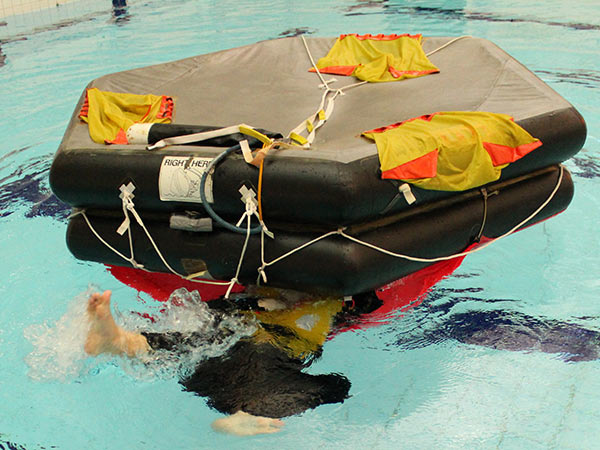
Training and qualifications
We outline likely requirements in the job descriptions below, or follow the link here to learn about key areas of superyacht training and certification that you can consider.
The Captain of any yacht (large or small) has one primary duty, which is the safe manning and operation of the yacht. This includes taking full responsibility for the crew, the tenders and toys, and the guests. Every crew member falls under the ultimate command of the Captain.
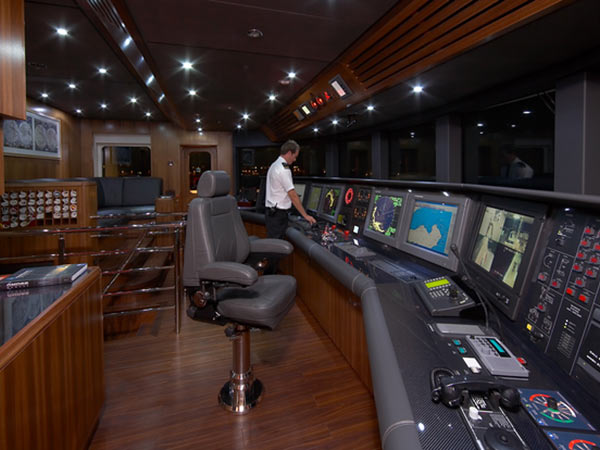
Chief Engineer
The Chief Engineer is in charge of the engineering department and is responsible for its safe and efficient operation. He or she reports directly to the Captain. As well as managing the Engineers, Electricians and ETOs (Electronic Technical Officers), the Chief Engineer has overall responsibility for the engineering department.
First & Second Officer
All superyachts generally have a First Officer on board, but larger yachts would employ a Second Officer as well. The roles are quite similar, but specific duties are likely to vary from one yacht to another.
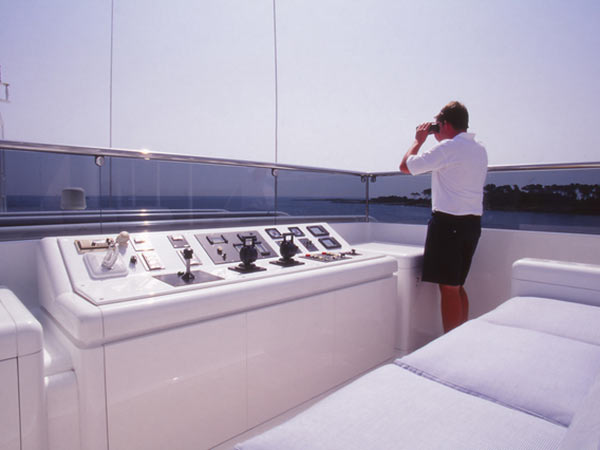
Chief Steward/Stewardess
A Chief Steward or Stewardess is most likely an experienced crew member who has progressed to this higher-ranking role. They are in charge of the interior of the yacht and manages and recruits the interior staff (such as Stewards and Housekeepers). They report directly to the Captain.
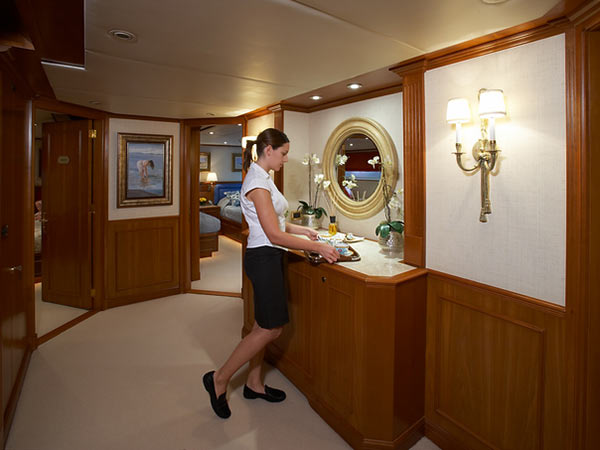
On a superyacht, regardless of the size, the food is one thing that a charter guest or an owner will always remember. The Chef plays an incredibly important role and is one of the key figures on board.
Engineer/Assistant Engineer
The main function of the Engineer is to maintain the mechanical and electrical operations of the yacht. This position will entail very large, complicated jobs, and it can, at the same time, incorporate something as small as fixing a remote control for guests, or fixing a toilet.
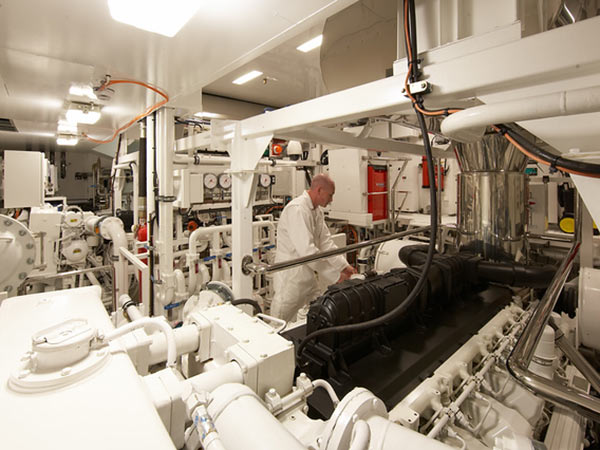
Technical Officer/Electrician
Electronic Technical Officers (ETOs) and/or Electricians are generally employed on larger superyachts where the Engineering department comprises around four or five crew. In some instances one person may fulfil both roles, or there may be different individuals for each. If there is no ETO or Electrician on board, their responsibilities would fall to the Engineer. ETOs and Electricians usually report to the Chief Engineer.
Steward / Stewardess
The most important aspect of the Steward/ess role is his/her attention to detail. This type of position requires the ability to think ahead, provide a service before the guest makes the request and to anticipate events before they happen. Most importantly, you must exhibit the ability to discreetly serve guests in a luxury 6-star manner.
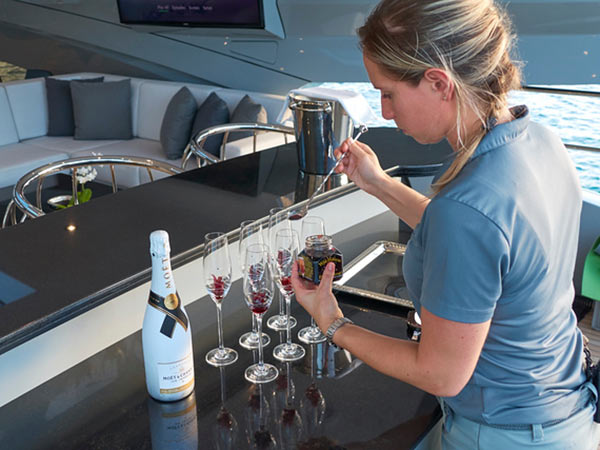
Second Chef/Sous Chef
On larger yachts, you will often find a Second Cook/Sous Chef who works along side a Chef. This person will normally bear all responsibilities in cooking for the crew, side work for meal preparation, and assisting the Chef in any variety of ways. A new-to-industry individual who aspires to be a professional yacht chef will greatly benefit from holding an assistant position.
The Bosun, sometimes known as the Leading Hand or Senior Deckhand, is likely to be an experienced Deckhand who is able to take on extra responsibilities. The Bosun is responsible for maintaining the exterior of the yacht immaculately and is in charge of the Deckhands.
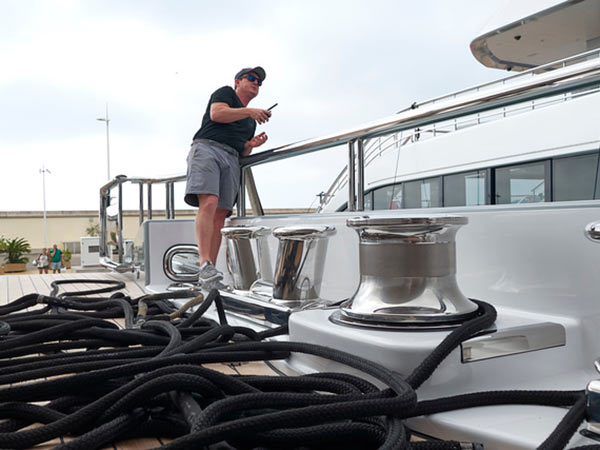
A deckhand is the entry level for almost all professional crew jobs on superyachts. The deckhand position will encompass many responsibilities, but most importantly, he/she will maintain the exterior of the yacht and keep it in pristine condition at all times. You could be the only deckhand on board, but on larger superyachts there may be as many as five or more deckhands working.

Yacht Engineer Training Courses
MCA Superyacht / SV Engineer training for vessels up to 9000kW and 3000GT
Yacht / SV Engineer Training Overview
Although there are different training routes and licensing authorities/countries under which engineers may qualify to work on superyachts, a common, broadly accepted route is the MCA Engineer Small Vessel Training Route. The MCA recently changed its engineering qualification structure in order to simplify the number and level of qualifications across the industry. They have pulled together pre-existing qualifications, leading to certificates of competency (CoC) restricted to yachts (and other small vessels) only. This single generic qualification is now referred to as " Engineer Officer Small Vessel Certificate of Competency" .
Please consult a recognized training provider before booking any training courses and view the "Engineer Officer Small Vessel of Competency" Marine Information note, found on the MCA website.
Find info, requirements and links to yacht engineer training centres for:
- Junior / Assistant Engineer
- 2nd Engineer Officer < 9000kW
- Chief Engineer Officer < 9000kW
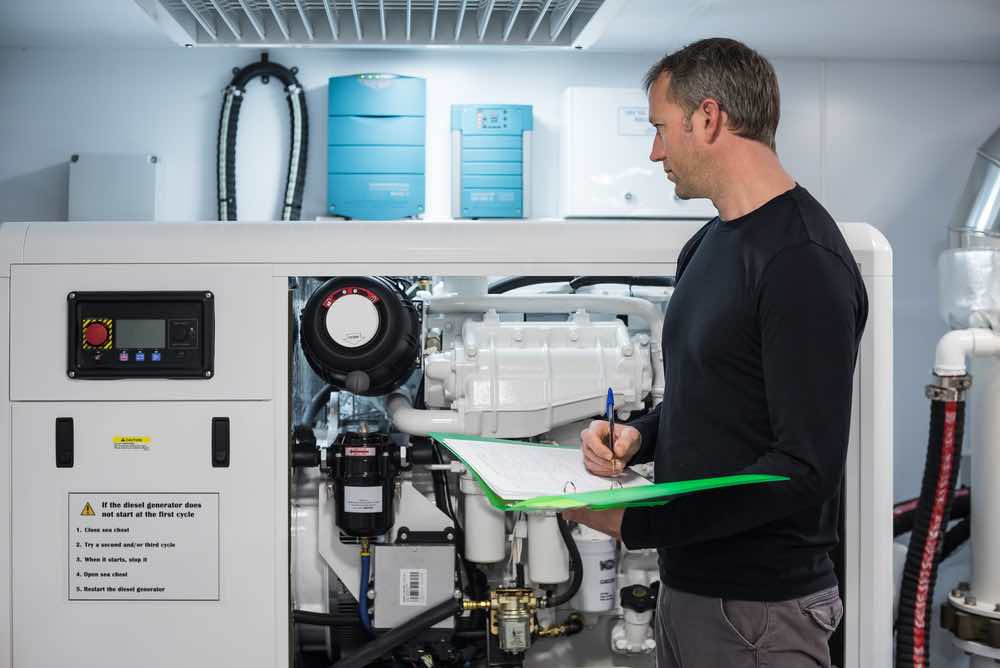
Junior / Assistant Engineer:
- An STCW : EVERY crew member onboard must hold a valid STCW
- An ENG1 Medical Certificate : EVERY crew member onboard must hold a valid ENG1
- AEC 1: The Approved Engine Course 1 is an entry-level qualification for the MCA engineering training schedule and is regarded as the first step on the ladder. It is generally a 5-day / 30-hour course that aims to provide candidates with practical basic hands-on training and theoretical knowledge of diesel engines. The main intention of this course is to teach the knowledge to serve in an ENTRY LEVEL capacity in the engineering department or for a crew member primarily working in another department to assist with engineering functions, for example, a deck/engineer. Holding an AEC certificate will allow you to be a chief engineer on a yacht over 24m and less than 200 Gross Tons or act as an assistant engineer on vessels over 200 GT up to 60NM from a safe haven.
- AEC 2: The Approved Engine Course II follows on from AEC I knowledge. It contains a more practical element when compared to the AEC I. This course has been designed so that engineering qualifications are transferable between different industry sectors such as yachts, workboats, tugs, fishing vessels and so on and there will no longer be offshore limits.
The AEC is your gateway ticket into becoming an engineer, it is, therefore, essential to hold this qualification, gain sea time and work on your training record book (TRB) in order to progress in the engine room.
Becoming a 2 nd Engineer:
There are three routes to obtaining a 2 nd Engineer Officer Small Vessel Certificate of Competency’ (Previously known as Y4):
- Standard Route
- Experienced Seafarer Route
- Alternative Route (For Graduate Engineers)
Standard Route:
This standard route benefits those who study through an accepted route of education involving MSQ (Maritime Studies Qualifications) modules. Completion of these will result in a Diploma in Maritime Studies: Small Vessel Engineer’. This route is extremely beneficial to superyacht engineers because of the reduced sea time required and because some of the syllabi can be completed on-board.
In order to follow this route, you must:
- Hold a Diploma in Maritime Studies: Small Vessel Engineer
- Complete Approved Engine Course I (AEC I) as well as The Approved Engine Course II (AEC II)
- Have completed 12 months’ combined sea service and workshop training, which must include: - 6 months’ seagoing service engaged in watchkeeping or Unmanned Machinery Space (UMS) duties on vessels of at least 350 kW; - 5 months’ seagoing service on vessels of at least 350 kW; - 2 weeks MCA-approved Initial Workshop Skills Training; - A further 2 weeks seagoing service on vessels of at least 350 kW or 2 weeks of MCA-approved additional Workshop Skills Training.
- Complete the MNTB Small Vessel Training Record Book (TRB)
- Complete the Diploma in Maritime Studies: Small Vessel Engineer
- Pass the MCA-approved written exams for - Marine Diesel Engineering ; - Auxiliary Equipment Part – 1 ; - Operational procedures, Basic Hotel Services and Ship construction
- Hold the applicable ancillary and safety courses: - All STCW Basic Training Modules - PSCRB - Advanced Fire Fighting - Proficiency in Medical First Aid - Human Element, Leadership and Management (Operational Level)
- Hold a valid ENG1 Medical Certificate or MCA accepted Equivalent
- Complete MCA oral examination for Second Engineer Officers on Small Vessels less than 9000 kW, less than 3000 GT, unlimited area, III/2 (syllabus available online, go to www.gov.uk and search “Small Vessel Oral Examination Syllabus”).
Experienced Seafarer Route:
This route is for existing seafarers serving on small vessels. You will not be required to complete the Diploma in Maritime Studies: Small Vessel Engineer , however you will need to complete a preparatory college course and SQA written examinations.
To be eligible to register for a study programme you must meet the following requirements:
- Have completed 24 months’ seagoing service on vessels of at least 200 kW
- Hold an Approved Engine Course (Both AEC 1 & AEC 2 )
- Hold STCW Basic Safety Training certificates: - Personal Survival Techniques (STCW Code A-VI/1-1) - Fire Prevention and Fire Fighting (STCW Code A-VI/1-2) - Elementary First Aid (STCW Code A-VI/1-3) - Personal Safety and Social Responsibilities (STCW Code A-VI/1-4)
Requirements / Notice Eligibility to sit MCA Oral Exam:
In addition to the above, candidates must complete the following in order to be issued with a notice of eligibility (noe) to sit an mca oral examination:.
- Additional 11 months’ seagoing on a vessel of 350 kW (must include a minimum of 6 months' seagoing service engaged in watchkeeping or UMS duties)
- 2 weeks MCA-approved initial Workshop Skills Training
- A further 2 weeks seagoing service on vessels of at least 350 kW or 2 weeks of MCA-approved additional Workshop Skills Training.
Certificate of Competency (Coc):
In addition to completing all of the experienced seafarer route requirements above, the candidate must:
- Complete and pass the following courses:
- MCA Marine Diesel Engineering
- MCA Auxiliary Equipment Part - 1
- Operational procedures, Basic Hotel Services and Ship Construction
2. Hold the applicable ancillary and safety course certificates listed in section 5:
- All STCW Basic Training Certificates - PSCRB - Advanced Fire Fighting - Proficiency in Medical First Aid - Human Element, Leadership and Management (HELM Operational Level)
3. Hold a valid ENG1 Medical or ENG1 Medical Equivalent Certificate 4. Pass the MCA oral examination for Second Engineer Officers on Small Vessels less than 9000 kW, less than 3000 GT, unlimited area, III/2 (syllabus available online, go to www.gov.uk and search “Small Vessel Oral Examination Syllabus”)
Alternative Route: (For Graduate Engineers:)
This route is for those candidates who hold a relevant engineering degree/diploma/apprenticeship. These qualifications should be sent to an MCA-approved training provider who will analyze their relevance and explain what the individual should do in order to obtain a 2 nd Engineer Officer Small Vessel CoC.
More information on the types of Graduate and Apprenticeship holders that qualify for this training route can be found in section 3.5 of the MIN 524 Notice .
If you are deemed eligible to enter into this programme you will need to apply directly to an MCA-approved nautical college. In order to find an appropriate college, search www.gov.uk for “MCA-approved nautical colleges".
In order to gain the Certificate of Competency you must:
- Complete a minimum of 6 months’ seagoing service engaged in watchkeeping duties
- Additional seagoing service / Workshop Skill training requirements based on the relevant HND, HNC or Engineering Apprenticeship, as laid out in point 3.5.3 of the MIN 534 Notice.
- Hold an Approved Engine Course I (AEC I)
- Hold an Approved Engine Course II (AEC II)
- Successfully Complete the MCA-approved modules and pass the corresponding exams for:- Marine Diesel Engineering - Auxiliary Equipment Part - 1 - Operational Procedures, Basic Hotel Services & Ship Construction
- Hold the applicable ancillary and safety course certificates:- All STCW Basic Training Certificates - PSCRB - Advanced Fire Fighting - Proficiency in Medical First Aid - Human Element, Leadership and Management (HELM Operational Level)
- Hold a valid ENG1 Medical or ENG1 Medical Equivalent Certificate
- Pass the MCA oral examination for Second Engineer Officers on Small Vessels.
Becoming a Chief Engineer :
- Chief Engineer 3000kw & <500GT
- Chief Engineer 9000kw & <3000GT
Chief Engineer Officer < 3000kW & 500GT
In order to qualify for the issue of this Certificate of Competency you must meet the following requirements:
- Complete a minimum of 6 months’ seagoing service as a Second Engineer on vessels of at least 350 kW (While holding an SV Second Engineer Officer < 9000kW & 3000GT STCW Convention regulation III/2 Certificate of Competency.
- Successfully complete the MCA- approved modules and pass the corresponding written examinations for - Chief Engineer Statutory and Operational Requirements - Auxiliary Equipment part - 2
- Hold the applicable ancillary and safety course certificates: - All STCW Basic Training Certificates - PSCRB - Advanced Fire Fighting - Proficiency in Medical First Aid - Human Element, Leadership and Management (HELM Management Level)
- Pass MCA oral examination for Chief Engineer Officer, less than 3000 kW, less than 500 GT, unlimited area, STCW Reg III/3
Chief Engineer SV <3000 GT & <9,000kW
- 24 months of seagoing service which must include:12 months as an SV Second Engineer or SV Chief Engineer while holding the applicable STCW Convention regulation III/2 Certificate of Competency:
- 6 months of sea service on 350 kW vessels & 6 months seagoing service on vessels 750 kW. (greater or equal to kW provided)
- Chief Engineer (SV) Statutory and Operational Requirements (Not required if SV Chief Engineer less than 3000 kW, less than 500 GT CoC already held)
- Chief Engineer (SV) Auxiliary Equipment Part 2 (Not required if SV Chief Engineer less than 3000 kW, less than 500 GT CoC already held)
- Applied Marine Engineering
- Complete either:a) MCA-approved modules and pass the corresponding written examinations for: General Engineering Science I & General Engineering Science II (exemptions may apply for candidates holding appropriate engineering degree) OR The Diploma in Maritime Studies: Small Vessel and the Diploma in Maritime Studies: Small Vessel Chief Engineer
- All STCW Basic Training Certificates
- Advanced Fire Fighting
- Proficiency in Medical First Aid
- Human Element, Leadership and Management (HELM Management Level)
- Pass the MCA oral examination for Chief Engineer Officer, less than 9,000 kW, less than 3,000 GT, unlimited area, STCW Reg III/3
FOR MORE INFO GO TO MCA WEBSITE MIN524
Alternative Routes to Become a Yacht Engineer:
The above method is the new MCA-approved and advised route to become a YACHT engineer, there are however other options available to you:
Experienced Marine Engineers: Marine engineers with qualifications for larger vessels, such as commercial tankers, container vessels, dredgers etc. or those with merchant navy tickets are usually able to work on yachts with these tickets. It is important to contact the MCA who will review these qualifications and ascertain a plan of action for you.
USCG: It is also possible to qualify as a yacht engineer through the United States Coast Guard route, again different flag states will have different requirements and it is advisable to contact the MCA for any further advice or information.
Find a Training Course Provider
Select a Course in order to view all training providers (use the location filter on the results page in order to refine your search).
STCW Basic Training Advanced Fire Fighting Approved Engine Course (AEC) HELM General Engineering Science 1 General Engineering Science 2 Proficiency in Medical First Aid SV Marine Diesel Engineering Proficiency in Survival Craft & Rescue Boats (PSCRB) SV Auxiliary Equipment SV Operational Procedures SV Applied Marine Engineering
Username or Email Address *
Remember me Lost your password?
Username or Email
Get New Password
Entry Level Yachting Qualifications
Essential courses to kickstart your yachting career.
IIf you are looking for a job in the yachting industry for the first time, certain training courses are essential and others are highly desirable in the eyes of potential employers. We offer a full range of entry-level training courses in Antibes and Palma.
The five-day STCW Basic Safety Training package comprises the MCA-accredited modules: Personal Survival Techniques, Fire Prevention and Fire Fighting, Elementary First Aid and Personal Safety and Social Responsibilities. Together, they form an essential programme of pre-sea training necessary for working on board.
- STCW Basic Crew Training
After mastering the basics, it's time to explore additional courses to enhance your skill set and take on more responsibilities in your career. Some of these courses include:
- Power Boat Level II: Develop your boat handling skills, learning essential techniques like turning, mooring, and anchoring This certification will enhance your professional qualifications, in particular for those that may be involved in tender operations onboard.
- Engineering Courses: For those interested in starting a career in the engineering department onboard, the Approved Engine Course 1 (AEC1) and the Approved Engine Course 2 (AEC2) will expand your technical knowledge base and introduce you to the maintenance and servicing of engines onboard.
- Security Courses: Proficiency in Security Awareness (PSA) provides an introduction to security on board and Proficiency in Designated Security Duties (PDSD) is intended for seafarers taking on security duties on board.
- Find useful information to help you start and pursue a career in the superyacht industry.
- For more information on these courses, do not not hesitate to contact us
- Brokerage New Construction How to Buy How to Sell
- Yacht Fleet Yacht Catalog Charter Marketing Destination Guides
- Financial Services Payroll & Accounting Payroll Service Process Logistical Support Admin Services Crew Admin
- Job Descriptions Crew FAQ
- About Sitemap

- Yacht Department Directory
- Deck Department
About the Deckhand
A deckhand is a position aboard with primary duties including cleaning and maintenance of the exterior of the vessel. Vessels will usually consider a successful candidate that already has experience in the superyacht industry and is keen to learn and work hard. It is essential that the deckhand can perform assigned tasks efficiently with a positive attitude in addition to interacting with owners and guests in a professional manner.
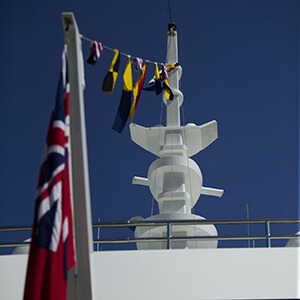
Job Responsibilities
- Cleanliness of the yacht wash downs, stainless polishing, waxing
- Assisting bosun and mate in maintenance projects; sanding and taping up for varnishing or painting, caulking, filling
- Continued learning of yacht maintenance, operations and systems; line handling, tender driving, navigation, safety, water sports
Required Skills
- Good work ethic
- Positive attitude
- Ability to learn on the job
- Ability to take direction
- Professional appearance
Salary Modifiers
- Engineering experience or certificate
- Sports certification (i.e. dive certificate, kite surfing instructor)
- Extensive fishing knowledge
- Tender driving license
- Carpentry skills
- No tender driving certification
Position Statistics
Career path, senior master, junior captain, first officer / chief mate, officer of the watch, junior deckhand.

How To Work On Yachts In Europe: What You Need To Know

Dreaming of a life on the high seas, living on a luxurious yacht and exploring Europes stunning coasts? Working on a yacht in Europe is an exciting and rewarding experience, but there are a few key things you need to know before you get started.
In this article, well be exploring the types of yacht jobs available in Europe, how to get a valid license, what qualifications and experiences are needed, and the medical check-ups required.
Plus, well look at the pros and cons of working on a yacht in Europe.
So, if youre ready to set sail on the adventure of a lifetime, read on to learn more!.
Table of Contents
Short Answer
In order to work on a yacht in Europe, you need to obtain the necessary qualifications, such as a sailing or motorboat license.
You can then look for work with a yacht charter company or even a private owner.
Additionally, you should be prepared to obtain a visa for the country in which you wish to work, as some may require this.
Finally, many employers will require a valid first aid certificate and a valid STCW (Standards of Training, Certification, and Watchkeeping) certificate.
Types of Yacht Jobs Available in Europe
When looking for a job on a yacht in Europe, there are many types of positions available depending on your qualifications and experience.
For those with a valid license, captains are always in high demand.
Captains are responsible for the overall operation of a vessel and must possess expert knowledge of navigation and safety.
Additionally, captains must be able to lead a crew and oversee the day-to-day operation of the vessel.
Those with experience in sailing and navigation can also apply for a first mate position.
First mates are responsible for the navigation and safety of the vessel and must have a good understanding of the laws and regulations of the country in which they are working.
For those with experience in boat maintenance, a position as a mechanic or engineer is available.
Mechanics and engineers are responsible for keeping the vessel in top condition, as well as troubleshooting any mechanical issues that arise.
Finally, those with experience in hospitality and customer service can apply for a position as a steward or chef.
Stewards and chefs are responsible for providing excellent service to passengers on board the vessel, as well as preparing and serving meals.
Overall, there are many types of yacht jobs available in Europe for those with the right qualifications and experience.
Depending on your skills, you can find a job that fits your interests and experience level.
Obtaining a Valid License for Working on a Yacht in Europe

Obtaining a valid license for working on a yacht in Europe is essential for anyone looking to pursue a career in the maritime industry.
Depending on the country in which you plan to work, you may need to obtain a valid license from the local maritime authority.
This will usually require passing a series of tests and exams to demonstrate your knowledge and understanding of the maritime industry.
Additionally, you may have to provide proof of experience and certification in sailing, navigation, or boat maintenance.
It is important to check with the local maritime authority to find out what is required in order to obtain a valid license.
Once you have the required qualifications, you will be able to start working on a yacht in Europe.
Familiarizing Yourself with Maritime Laws and Regulations
Working on a yacht in Europe is an exciting and rewarding experience, but it also requires that you understand and adhere to the local laws and regulations governing the industry.
Maritime laws and regulations can vary from country to country, so it is important to ensure that you are up to date on the specific laws and regulations that apply to the country in which you plan to work.
The first step in familiarizing yourself with the maritime laws and regulations is to contact the relevant government department or agency in the country you plan to work in.
They will be able to provide you with the most up-to-date information about the laws and regulations that apply to the maritime industry in that country.
Additionally, this is a great opportunity to ask any specific questions you have about the particular laws and regulations that apply in the country you plan to work in.
It is also important to understand the international laws and regulations that apply to the maritime industry.
This includes laws that regulate the safety of vessels and personnel, as well as environmental regulations that apply to the operation of vessels.
Additionally, there are other international conventions and treaties that regulate the operation of vessels in international waters.
You should make sure you are familiar with these laws and regulations, as they may affect the operation of the vessel you plan to work on.
Finally, you should also familiarize yourself with the regulations of the flag state the vessel is registered in.
This includes the requirements for vessel registration, crew qualifications, vessel operations, and safety equipment.
Understanding these regulations is important, as it will help ensure the vessel is operated safely and in compliance with the law.
By familiarizing yourself with the maritime laws and regulations that apply to the country you plan to work in, as well as international and flag state regulations, you can ensure you are properly prepared for your position on a yacht in Europe.
This will help to ensure that you can confidently and safely perform your duties, and will help you to make the most of your experience working on a yacht in Europe.
Experiences Needed for Working on a Yacht in Europe

For those looking to work on a yacht in Europe, it is important to have experience in the maritime industry.
This experience can come in a variety of forms, including sailing, navigation, and boat maintenance experience.
Having experience in all three of these areas is ideal but having at least some knowledge of one or more of them is essential.
Sailing experience is necessary to understand the basics of how a boat works and how to maneuver it.
Navigation experience is essential for understanding how to safely navigate a boat in unfamiliar waters.
Finally, boat maintenance experience is necessary for servicing the boat and making sure it is in proper working condition.
In addition to having experience in the maritime industry, it is important to have a valid license for the country in which you plan to work.
This license will enable you to legally operate a boat in that countrys waters.
It is also important to be familiar with the laws and regulations governing the maritime industry in the destination country.
This will ensure that you comply with all local laws and regulations while operating a boat.
Finally, it is important to have a medical check-up to ensure you are fit to work on a yacht.
This check-up should include physical exams, blood tests, and other medical tests to ensure you are healthy and able to work on a yacht.
With the proper qualifications and training, working on a yacht in Europe can be a great adventure.
It can provide an opportunity to explore the world, meet new people, and gain invaluable experience in the maritime industry.
With the right preparation and knowledge, you can make the most of your working experience on a yacht in Europe.
Medical Check-Ups Required to Work on a Yacht
For those considering working on a yacht in Europe, it is important to understand the medical requirements before applying.
You will need to obtain a valid medical certificate from an approved doctor or medical professional that certifies your fitness to work on a yacht.
This certificate is often referred to as a fitness to work certificate and is required for all crew members on a vessel.
The certificate must be issued within the last 12 months and must include a statement that you are medically fit to work on a yacht.
Depending on the laws and regulations of the destination country, you may also need to provide a copy of your medical records and any relevant medical tests and/or screenings.
These tests may include vision, hearing, and blood tests.
It is important to note that the medical certificate is only valid for the country in which it was issued.
If you plan to work on a yacht in a different country than where you obtained the certificate, you must obtain a new one from a doctor or medical professional in the country you plan to work in.
Additionally, depending on the country and maritime regulations, some crew members may be required to undergo regular medical checks to ensure their fitness to work on a yacht.
By obtaining a valid medical certificate and undergoing any required medical checks and tests, you can ensure that you are medically fit to work on a yacht.
This is a necessary step in working on a yacht in Europe and will help ensure the safety of both you and your fellow crew members.
Qualifications Needed to Work on a Yacht in Europe

If youre looking to work on a yacht in Europe, there are a few qualifications youll need to meet.
First, youll need to obtain a valid license for the country in which you plan to work.
Different countries may have different requirements for licensing, so be sure to research the laws and regulations in the destination country.
Additionally, it is important to have experience in the maritime industry, such as sailing, navigation, or boat maintenance.
This experience will be essential for working on a yacht.
You may also need to have a medical check-up to ensure you are fit to work on a yacht.
You will also need to be familiar with the laws and regulations governing the maritime industry in the destination country.
Depending on the country, you may need to take an exam to prove your knowledge of the regulations.
In some cases, you may even need to take a course to qualify for the exam.
You may also need to demonstrate a certain level of physical fitness before you can be approved to work on a yacht.
Depending on the country, you may need to take medical exams or complete physical tests to prove your fitness.
Finally, you may need to provide references from past employers or other professionals.
This will help demonstrate your skills and experience in the maritime industry.
By meeting all the qualifications, you can ensure that you have the necessary skills and experience to work on a yacht in Europe.
Pros and Cons of Working on a Yacht in Europe
Working on a yacht in Europe can be a rewarding and exciting experience.
You can travel to many different countries and explore the cultures and landscapes of the continent.
You will also gain valuable experience in the maritime industry, such as navigation, sailing, and boat maintenance.
However, there are also some drawbacks to consider before embarking on your journey.
For starters, you will need to obtain a valid license for the country you plan to work in.
This can be a long and costly process, as it involves completing a number of courses and exams.
Additionally, you will need to be familiar with the laws and regulations governing the maritime industry in the destination country.
This can be a challenge if you are not familiar with the language or culture of the country.
You will also need to have experience in the maritime industry, such as sailing, navigation, or boat maintenance.
If you do not have this experience, you may need to take courses to gain the necessary qualifications.
Finally, you may need to have a medical check-up to ensure you are fit to work on a yacht.
Ultimately, the pros and cons of working on a yacht in Europe should be weighed carefully before making the decision to take on the job.
While it can be a great adventure and a great way to gain experience in the maritime industry, it is important to ensure that you are adequately prepared and qualified for the job.
Final Thoughts
Working on a yacht in Europe is a great way to explore a new place and gain valuable experience in the maritime industry.
With the right qualifications and training, it can be an exciting and rewarding experience.
If you are considering working on a yacht in Europe, make sure you obtain a valid license, familiarize yourself with the laws and regulations, and have the experience and qualifications needed.
Lastly, don’t forget to get a medical check-up! By taking the necessary steps and doing your research, you can be ready to embark on a journey of a lifetime.
James Frami
At the age of 15, he and four other friends from his neighborhood constructed their first boat. He has been sailing for almost 30 years and has a wealth of knowledge that he wants to share with others.
Recent Posts
Does Your Boat License Expire? Here's What You Need to Know
Are you a boat owner looking to stay up-to-date on your license requirements? If so, youve come to the right place! In this article, well cover everything you need to know about boat license...
How to Put Skins on Your Boat in Sea of Thieves? (Complete Guide)
There is a unique sense of pride and accomplishment when you show off a boat you customized to your exact specifications. With Sea of Thieves, you can customize your boat to make it look like your...

Man Forced To Hide His Boat Behind A Fence Has Super Realistic Boat Painted On The Fence
C ity and housing community municipal codes seem to target people who like working on their vehicles or parking them in plain sight, but one Seaside, California man found a creative way to flip a figurative bird to these frivolous codes. Etienne Constable received a notice from the city requesting he comply with a municipal code restricting parking for non-passenger vehicles, and he had to store his boat behind a 6-foot-high fence so it wouldn’t be visible from the street. Constable found a creative way to comply while still conveying distaste by having a neighbor and muralist paint his new fence to appear invisible.
Constable has lived in Seaside for 29 years. He’s parked his current boat in his driveway for four years, and a previous boat for many years prior to suddenly receiving this code compliance notice. Constable was forced to pave his driveway in order to install the fence that the city of Seaside required he store his boat behind, so the endeavor was more labor intensive than just moving the boat behind a pre-existing fence. The Los Angeles Times reported,
He [Constable] said he was surprised and unaware of the city code about non-passenger vehicles. “We’ve been here for a long time,” Constable said, “and nobody had ever said anything before.” Last year, the city hired a community enhancement staffer to identify code enforcement violations throughout the city that needed to be remedied, said Nick Borges, acting city manager and Seaside police chief. If the boat wasn’t concealed, the notice stated noncompliance was punishable by a first offense of a $100 fee, according to Constable.”
Feedback from neighbors and social media users has been overwhelmingly positive and supportive of Constable’s artistic boat storage solution, with other neighbors reportedly asking for similar murals on their fences. The artist behind the lifelike masterpiece is Constable’s next-door neighbor Hanif Panni, a multi-medium artist. Initially, Panni and Constable were tossing around ideas of what to paint on the fence when the boat mural was mentioned as a joke, but it ended up becoming a reality.
Borges isn’t offended by the mural, saying the creative response to the city’s municipal code helped create a better relationship among neighbors. “It does help cities like us get better” and identify whether some city codes should be enforced a certain way, he said.”
This kind of respectful disobedience brings me a lot of joy. I have a tough time respecting illogical and inconsequential rules, so I’m glad to see that Constable and Panni came together to make a statement about their community’s frivolous rules through the power of art.
For the latest news, Facebook , Twitter and Instagram .

- Skip to global NPS navigation
- Skip to the main content
- Skip to the footer section

Exiting nps.gov
Thing to Do
Boat Lake Mohave
NPS/A. Cattoir
Lake Mohave encompasses everything south of the Hoover Dam down to Laughlin, NV. During the summer, you will find many out enjoying the sparkling waters. Boaters can utilize three launch ramps to access different parts of this lake:
- Willow Beach - access the Black Canyon and the Hoover Dam up to the security zone.
- Cottonwood Cove - access Eldorado Canyon and several sandy coves and beaches.
- Katherine Landing - the southern most point of the park with access to Telephone Cove and Princess Cove.
Before You Launch
Visitors can access Lake Mohave's launch ramps with a park entrance pass. It's important to note that all watercraft must be inspected for invasive species prior to launching, and boaters should always be aware of speed limits, no-wake zones, and other regulations to ensure a safe and enjoyable experience on the water.
Rent a Boat
Lifejacket requirements, state boating laws, current conditions and park alerts.
Lake Mead National Recreation Area
- lake mead national recreation area
- lake mohave
Boating Information
Who may operate a vessel.
All persons who operate vessels powered by a motor over 15 horsepower and who were born on or after January 1, 1983, must take and pass a boater education course or proficiency exam. The course exam must be one that is approved by NDOW.
A person operating a personal watercraft must be at least 14 years of age.
A person operating a vessel that is towing a person on water skis, a surfboard or any other device must be:
At least 16 years of age or...
At least 14 years of age and have on board a person at least 18 years of age in a position to supervise the operator.
In Arizona It is illegal for a person under the age of 12 to operate a vessel with a motor greater than 8 horsepower (which includes personal watercraft) unless:
An emergency exists or...
The child's parents or legal guardian is on board or...
Another person at least 18 years of age is on board.
Virtual Vessel Safety Check
Before you launch, make sure that your vessel meets the federal requirements below.
Display your boat's registration numbers on each side of the forward half of the boat.
Carry a copy of current state registration documents on board.
You must have a properly fitting, serviceable life jacket readily available on board for all occupants.
Have a way to make a suitable day and night distress signal (flare, strobe light, etc.)
Keep a portable fire extinguisher on board (types required vary by vessel).
Follow ventilation requirements for your vessel type.
All gasoline-powered inboard/outboard or inboard motor boats must be equipped with an approved backfire flame control device.
Carry a sound-producing device (whistle, horn, etc.) that can be heard for at least 1/2 mile.
All boats (including paddlecraft) must be able to display navigation lights.
Boats 26 feet and over with a machinery compartment must display an oily waste pollution placard.
Boats 26 feet and over in length must display a "MARPOL" trash placard. Boats 40 feet and over must also display a written trash disposal plan.
Any installed toilet must be a Coast Guard approved device. Overboard discharge outlets must be capable of being sealed.
Boats 39.4 feet and over must have on board a current copy of the Navigation Rules .
Keep your deck free of hazards with a clean bilge.
Protect fuses or manual reset circuit breakers from rain or water.
Portable fuel tanks must be made of non-breakable material with a vapor-tight, leak-proof cap.
Two Stroke Vessel Regulations
Boat storage, lake mohave launch ramps.
Sort By: Relevance Recently Updated Date Released Title
Show 10 40 per page
Last updated: May 7, 2024

- Weather
Search location by ZIP code
Officials working on keeping sea turtles safe during nesting season ahead of cocoa beach boat race.
- Copy Link Copy {copyShortcut} to copy Link copied!

GET LOCAL BREAKING NEWS ALERTS
The latest breaking updates, delivered straight to your email inbox.
For the 15th time, speed boats will take to the water for the Thunder on Cocoa Beach race this weekend, but it comes during a delicate season for sea turtles.
While the big race boats are out on the water offshore, trained eyes will scan the water for marine wildlife. Sea turtles will be the focus of this attention, as this is their nesting season.
The Sea Turtle Preservation Society has been involved with the race for 13 years, always concerned about boat strikes.
“It’s really great how it all works and the teamwork. So, their race director and program director talks with us. We have a volunteer in a helicopter that flies back and forth across the racetrack,” said Joel Cohen with the Sea Turtle Preservation Society.
They also have trained spotters who are on the water in boats along the racecourse, looking for sea turtles, manatees, and other marine life.
If one is seen, the helicopter is called in to verify.
“They drop a flare, and if the mammal does not move out of the area quickly, then they drop a red flare and they stop the race,” according to Thunder on Cocoa Beach Executive Director Kerry Bartlett. If the animal is in the way.
This layer of protection can slow down the race and has an added cost.
“We do this for the community. And we also enjoy mammals and wildlife; we live here. We feel that it is on us to protect the wildlife,” Bartlett said.
One of the biggest concerns for conservationists during the race is the people out on their own boats watching the race. There will be a lot of them, and unlike the racecourse, they don’t have official spotters. It’s recommended that if you are heading out on a boat, you designate one person to keep an eye out.
But even if you’re staying on the sand, race time or not, give the turtles some space.
“If you see a daytime nesting turtle in Brevard County, don’t approach the turtle, don’t touch the turtle. You are welcome to take pictures and watch from a distance. But also, please call the Sea Turtle Preservation Society,” Cohen added.
The collected data and information on nesting are critical in protecting all sea turtle species.
For more information on the Sea Turtle Preservation Society and nesting, click here .
For more information on Thunder on Cocoa Beach, click here .
AVAILABLE JULY 19
Full reveal coming tomorrow.
Pre-order** the MVP Bundle to make game day every day, and get both Madden NFL 25 and College Football 25 with exclusive content.
Sign up today to receive the latest College Football 25 news, updates, behind-the-scenes content, exclusive offers, and more (including other EA news, products, events, and promotions) by email.
You must sign in and sign up for College Football 25 and EA emails before you can redeem any reward.
You must sign up for the College Football 25 newsletter before you can redeem your item.
You've successfully signed up to receive emails about College Football 25 and other EA news, products, events and promotions. Unsubscribe at any time by changing your email preferences .
You’ve already signed up for College Football 25 newsletters with the above email. Please check your spam folder for the above email. If you still have troubles receiving the emails, please contact EA .
Sorry, you are ineligible to sign up for this newsletter.
Sorry, something has gone wrong. Please try again later.
DNR working with private companies to restore, fund Belle Isle Boat House

Concern about the fate of the Belle Isle Boat House has resurfaced after an annual report presentation on Belle Isle during a Detroit City Council meeting on Tuesday.
The boathouse, built in 1902 and used to house the Detroit Rowing Club, has stood dilapidated and empty since August 2022, when sections of the ceiling, floor, and exterior stucco collapsed. After architects estimated the cost of restoration efforts at around $54 million, the Michigan Department of Natural Resources (DNR), which acquired the boathouse when it acquired Belle Isle in 2014 , has searched for solution after solution to make use of its limited funding.
The DNR has toyed with the idea of demolition, and although it's still not off the table, they are now attempting to partner with a private company to save the building and possibly reimagine the boathouse.
"We did send out a public survey to ask folks what they would like to see, and obviously, the majority of the public's sentiment was to save it. ... But that doesn't mean that the funding is there to do so," said Thomas Bissett, the urban district supervisor for the parks and recreation division of the Michigan DNR. "I don't think that (the DNR) wants to demolish it ... What we want is that if it's something that's going to be restored, for it be restored appropriately but then also for it to be funded in the future."
Earlier this year, the DNR began accepting proposals from private companies to redevelop the boathouse , hoping for proposals from people with backgrounds in development and historical rehabilitation with financial backing to submit a viable proposal.
More: Belle Isle’s transformation under state control: What's changed, what's still coming
By the March 31 deadline, the DNR had received five letters of intent, three of which were selected to move forward in the process. They now have until July 31 to submit a formal proposal to the DNR.
"At that point, we would sit down and review them and see if any of them are viable, as far as being able to first fund it but continue to operate it through their plan," said Bissett. "It'd be great to fix it, but it has to fund the facility, and most importantly we want a key aspect of that to remain open to the public. The last thing we want is it to be a building on Belle Isle that's not open to the public.
"We can do lots of improvements, but if we restore the building so it just sits there, that doesn't make any sense for the public."
More: Belle Isle Boat House needs $54M renovation as demolition remains an option
Bissett said that the DNR does not know the extent or viability of the proposals.
"No decision has been made yet to whether one of these proposals would be accepted or whether (the boathouse) would be demolished. ... What they gave us in that letter of intent was just a skeleton. They identified a potential use and potential funding but nothing was set in stone," said Bissett.
What's more, the DNR is on a time crunch. Bissett said the $23 million in funding for the park that the DNR has from the American Rescue Plan Act (ARPA) must be allocated and signed in a construction contract by the end of this year.
In the meantime, Bissett and the DNR have been taking the people behind the proposals, as well as any engineers, financiers, and other experts, to view the site and assist them in creating their formal submissions at the end of July.
"The main thing is that we've done exactly what we said we were going to do: We said we were going to ask the public and we did so, we said we were going to put out a request for letters of intent and we did so, and now we're working with those three groups to help them develop their proposal going forward," said Bissett.

IMAGES
VIDEO
COMMENTS
You cannot work on board a luxury yacht without getting your basic qualifications first. Bluewater offers a full range of crew training courses for those just starting in the industry: STCW 95 Basic Training (Europe) 5 Day Course; Powerboat Level II 2 Day Course; Interior Introduction 3 Day Course; AEC 1 5 Day Course
The tips depend on the size of the Yacht and the guests, but a good estimate is 10 - 20% of the total weekly price of a Yacht. If you imagine a 50m (165 foot) Yacht with 9 crew, it typically charters for $150,000 - $250,000 per week. For simplicity, let's add a 15% tip for $200,000/wk.
Courses that introduce entry-level candidates to yacht interior work are offered in many countries around the world. "Bluewater hosts some fantastic courses; their Yacht Interior Service courses start at a zero-to-hero course and can really help with a newbie or green stewardess who wants to acclimate and understand the principles and products used on a vessel," Bamforth says.
Inexperienced yacht crew working as deckhands or stewardesses can earn between $2000-3000 a month. With more experience and higher positions, your salary can be between $3500-$6000 a month. On charter trips, guests typically tip 5% - 15% of the weekly charter fee, which is split between crew members.
Go to a superyacht marina. 1. Have the right attitude. Along with gaining the correct qualifications to prove your competence, to become a Yachtie, you must have certain characteristics to thrive in this industry. Yachties have to be well presented, articulate, know how to take orders, and be able to work hard, all with a smile and enthusiasm.
Working hours for yacht crew members can vary depending on the yacht's schedule and guest requirements. Crew members may work long hours, often 12-16 hours per day, during busy charter seasons. However, there may also be periods of downtime between charters. Living conditions on a yacht can be tight, with shared cabins and limited personal space.
Qualifications required to work on board a yacht. All crew, regardless of their position on board, need to have completed the STCW Basic Safety Training along with obtaining a recognised Seafarers medical certificate, the most popular being the ENG1 which is issued by an MCA ( Maritime and Coastguard Agency) professional medic.
Learn about the different types of yachts, the roles available on board, and the lifestyle associated with working on a yacht. Read books, articles, and blogs written by experienced yachties to gain insights into the industry. Step 2: Obtain the Necessary Qualifications. To work on a yacht, certain qualifications and certifications are required.
2. Yacht CV. We write a professional CV to get your first yacht job fast and stand out. 3. PDSD and Large Yacht STCW. Mandatory Yacht Crew Security courses and Crowd and Crisis to work on the larges Mega yachts in the world. 4. ENG1 Included. Mandatory (MCA Equivalent) Medical Certificate for Seafarers included during the training week.
Dock walking is a good way of getting a job, mainly on small yachts. The usual way to obtain crew work is literally to walk the docks and marinas, visit crew agencies and even frequent pubs/cafés used by existing crew. It is important to dress appropriately, as you are selling yourself. Make sure that you 'look the part' as first impressions ...
2. Choose the Yacht Crew Department you Wish to Work in. Before joining the yachting industry, it is essential to decide on your career path. The work environment and duties associated with each superyacht department vary greatly. It is therefore advised that you understand the training, duties and requirements associated with each role.
Working on a yacht might sound like one of those dream travel jobs. And, you may think that yacht jobs are only for people who are knowledgeable about sailing, and are well-connected with the yachting community. ... The doctor will run through a list of requirements such as height, weight, blood pressure, reflexes, hearing and eye tests, and a ...
The full course comprises four modules/certificates: Personal Survival Techniques. Fire Fighting and Fire Prevention. Elementary First Aid. Personal Safety and Social Responsibility. This is the STCW minimum qualifications to work on ships and on commercial yachts. When you book our Deckhand and Stewardess packages you also get an included STCW ...
Working on a yacht is a unique and exciting experience, but it's important to understand the qualifications and experiences needed to land one of these jobs. Most positions require at least a minimum of boating experience, either through the military or through a recreational certification.
Chief Engineer (Yacht 4) - Less than 200GT and less than 1,500kW (1) Chief Engineer (Yacht 3) - Less than 500GT and less than 3,000kW (0) Chief Engineer (Yacht 2) - Less than 3,000GT and less than 3,000kW (0) Training courses for yacht crew and those who are looking for jobs on yachts: STCW, deck, engine, interior, culinary, etc.
It is the organisation responsible for maritime safety in the UK. This role encompasses setting the standard for training and certification for seafarers, including the minimum requirements for certification of superyacht crew. The MCA is an agency of the Department for Transport of the British Government. Even if you have completed similar ...
Super yacht Crew Training Centres are becoming a popular way for potential crew to obtain industry specific training under the watchful eye of the associated regulatory bodies, for example the MCS (Maritime and Coastguard Agency) covering foreign flagged yachts and the USC (United States Coastguard) covering US flagged yachts. Courses. To work ...
From the STCW and ENG1 Medical to The Food Safety Hygiene Level 2 and Interior Stewardess Training. There are lots of training courses to work on a yacht, some are required and some are extra's which can be to your advantage when first trying to get a job on a yacht. There are two must-have requirements to enter the industry and this includes ...
Careers in the superyacht industry. A superyacht is defined as any leisure yacht over 24 metres (79 feet) in length. There are many hundreds of superyachts sailing the seas and oceans today - motor or sail, and they employ thousands of crew members from around the world. Owning or chartering a multi-million-pound superyacht is an exclusive ...
Experienced Marine Engineers: Marine engineers with qualifications for larger vessels, such as commercial tankers, container vessels, dredgers etc. or those with merchant navy tickets are usually able to work on yachts with these tickets. It is important to contact the MCA who will review these qualifications and ascertain a plan of action for you.
Power Boat Level II: Develop your boat handling skills, learning essential techniques like turning, mooring, and anchoring This certification will enhance your professional qualifications, in particular for those that may be involved in tender operations onboard. Engineering Courses: For those interested in starting a career in the engineering ...
Sports certification (i.e. dive certificate, kite surfing instructor) Extensive fishing knowledge. Tender driving license. Carpentry skills. No tender driving certification. Yacht Deckhands have 0-3 years experience and are responsible for the Cleanliness of the yacht-wash downs, stainless polishing, waxing. They earn $30K - 38K based on yacht ...
With the proper qualifications and training, working on a yacht in Europe can be a great adventure. Final Thoughts. Working on a yacht in Europe is a great way to explore a new place and gain valuable experience in the maritime industry. With the right qualifications and training, it can be an exciting and rewarding experience.
Fair Use"/> C ity and housing community municipal codes seem to target people who like working on their vehicles or parking them in plain sight, but one Seaside,California man found a creative way ...
Yes. To boat at Lake Mead and Lake Mohave, you will need to pay an entrance pass or display a valid entrance pass to enter the park. In addition, you will also need a for each vessel to launch. These can be purchased at park entrance stations. Your boat must be registered and equipped with safety equipment in accordance with your state's vessel ...
Officials working on keeping sea turtles safe during nesting season ahead of Cocoa Beach boat race. For the 15th time, speed boats will take to the water for the Thunder on Cocoa Beach race this ...
OFFICIAL. COVER REVEAL MAY 16. 03 Days. 23 Hours. 33 Minutes. 27 Seconds. Sign up today to receive the latest College Football 25 news, updates, behind-the-scenes content, exclusive offers, and more (including other EA news, products, events, and promotions) by email. Birthdate.
Up to USD 5000. Location: Asia. Start date: Immediate. Job posted: May 13, 2024. As a Private Yacht Engineer, you will be responsible for the maintenance, repair, and operation of all mechanical and electrical systems on board a privately owned yacht. Working closely with the yacht captain and other crew members, you will ensure the safe and ...
Boat requirements: Unless you're taking out a personal loan, your lender will likely restrict the type, age and condition of the boat you want to buy. For example, Trident Funding only finances ...
By the March 31 deadline, the DNR had received five letters of intent, three of which were selected to move forward in the process. They now have until July 31 to submit a formal proposal to the ...